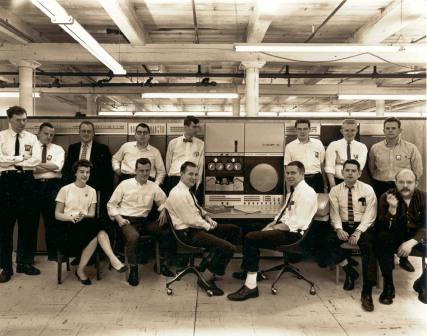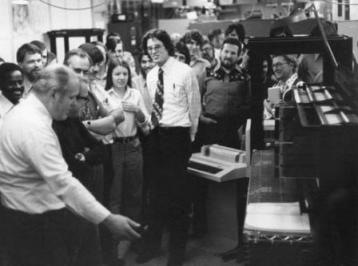29 Nov Gordon Bell
Gordon Bell distinguished computer architect and early manager of Digital Equipment Corporation (DEC). As Vice President of Research and Development in DEC golden age, he was responsible for Digital’s products.

Gordon Bell conducting a workshop: The Colonization of Cyberspace.
Institut d’Estudis Catalans, Barcelona, November, 1999. [from G.Bell collection]
Gordon Bell led the development of various mini- and time-sharing computers , DEC’s VAX and the VAX Computing Environment. Now he is the subject of MyLifeBits , experiment that fulfills Vannevar Bush’s 1945 Memex vision .
Bell is author of several books, patents, videotaped lectures and papers as well as the Law of Computer Class Formation .
In 2003 he wrote a postscript –What happened?? for Schein’s DEC is Dead, Long Live DEC , where he explains his inside point of view on the company’s downfall.
What follows is an exclusive short interview about the lessons on the failure of a technology and business leader.
Why it happened? Several reasons: the market had moved and was moving to UNIX and DEC was viewed as proprietary; the marketing organization that was responsible for getting the applications and controlling the revenue was disbanded and finally DEC made several engineering mistakes.
Main technological lessons in DEC history.- DEC was successful when it created or followed standards, e.g. Ethernet , but when it got out of the mainstream, it failed.

The executive staff really had a mistaken idea of the jewels being the architecture. Earlier on, it might have had a shot at standards based on its architectures. At the end, it was chasing every possible niche by having all versions of software on the PC, MIPS workstations, and VAX. Seven platforms in all. Sales folks simply didn?t know what to sell. And the systems were incomplete, because users bought applications not hardware platforms.
Management ones.- By in large, I think it was a management failure. The company was out of control as measured by its operating metrics. The company, thought it was in a recession versus a shift in the market to standards and commodities.
The three people at the top are to be blamed:
Ken [Olsen], who really lacked an understanding of computers, software, and especially the computer industry.

Ken Olsen with a DEC VAX.
[Image from the Computer Museum History .
The museum?s world-class artifact collection came from
the former Computer Museum, Boston, that Gordon Bell
co-founded in1979 with Gwen Bell ]
Jack Shields who took over all the sales, service, and marketing. Jack?s background as a service person was one of control, not one to listen to the customers or let other people be in charge. He destroyed the marketing organizations that were responsible for the revenue and third party software that DEC had pioneered.
Jack Smith who was in charge of engineering and manufacturing after I left in 1983. He –like the other two — lacked the visceral understanding of the market. One key mistake was having to invest so much in its own proprietary semiconductor factories.
Prisoner of its success ? Not really. The web, which occurred post Olsen, was the greatest market of all time. DEC had the first firewalls, servers, and client software for it. Also, they built a number of the first sites, they created AltaVista.
SUN prospered from the web, only to be caught up in the same issues that caused DEC?s demise.
The importance of being a leader, Lou Gestner [former CEO of IBM] vs Ken Olsen.- DEC could have survived and been HP, had the board acted to hire an outsider that would have acted to get the company?s operational characteristics in line with the industry.

Receiving the National Medal of Technology
by President George Bush (1991)
«for his continuing intellectual and industrial achievements in the field of computer design; and for his leading role in establishing … computers that serve as a significant tool for engineering, science, and industry.»



Sorry, the comment form is closed at this time.